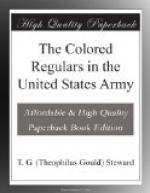then on the U.S. Army transports plying between
San Francisco and Manila. The ships used were
hastily fitted up for the occasion, and it could
not be expected that they would be all that was
required, but some of the appointments could
and should have been better. After a tedious
wait until June 14th, we sailed down Tampa Bay and
out on the Gulf of Mexico, still in ignorance
of our destination. The evening of the 15th
the light at Dry Tortugas was seen to our right.
June 16th, 17th and 18th our course was a little
south of east, and part of the time the north
coast of Cuba was visible. The weather (except
the intense heat) was fine. On Sunday morning,
June 18th, we entered the Windward Passage, and
it seemed certain, from our course, that Santiago
was our objective. Early the next morning
the high mountains of Santiago de Cuba were in plain
sight to our north. June 20th and 21st, remained
off the coast; the sea was rough and the vessel
rolled considerably, adding to the discomfort
of every one, especially those subject to seasickness.
During the evening of the 21st, orders were received
to be ready to disembark the following morning.
About 8 A.M. on the 22d our warships began shelling
the coast, and two hours later the troops started
in small boats from the transports to the shore.
By evening most of the Second Division and part
of the Cavalry Division were on Cuban soil.
There was no opposition to our landing; I believe
that a small force well handled could have made it
very difficult, if, indeed, it could not have
prevented it.
As soon as the regiment had landed it was marched out about four miles and bivouacked for the night. The country is rugged and covered with a dense tropical vegetation. A few “Cuban Patriots” had joined us and formed the extreme advance, saving us some disagreeable outpost duty. This was the only service that I know of them doing throughout the campaign, though they were always on hand ration day. Later developments showed that the service rendered was not so important, as any Spanish force had retired to a safe place, something our friends looked out for whenever there was any danger.
June 23d, the regiment started shortly after daylight towards the city of Santiago. About 9 o’clock there was a report that the enemy were in our front. The regiment was immediately formed for battle, and reconnoitering parties sent forward; after about thirty minutes’ delay the supposed enemy proved to be the large leaves of some tropical trees being moved by the wind, giving them the appearance of persons in motion. Our route was over a narrow trail, through a dense wilderness; water was scarce and the heat was intense. About noon we arrived at Siboney, where we bivouacked for the night. Before daylight next morning the troops in our rear were heard passing on the trail by our camp. Shortly after daylight Captain Capron’s battery of four guns passed, and the men lined up along




